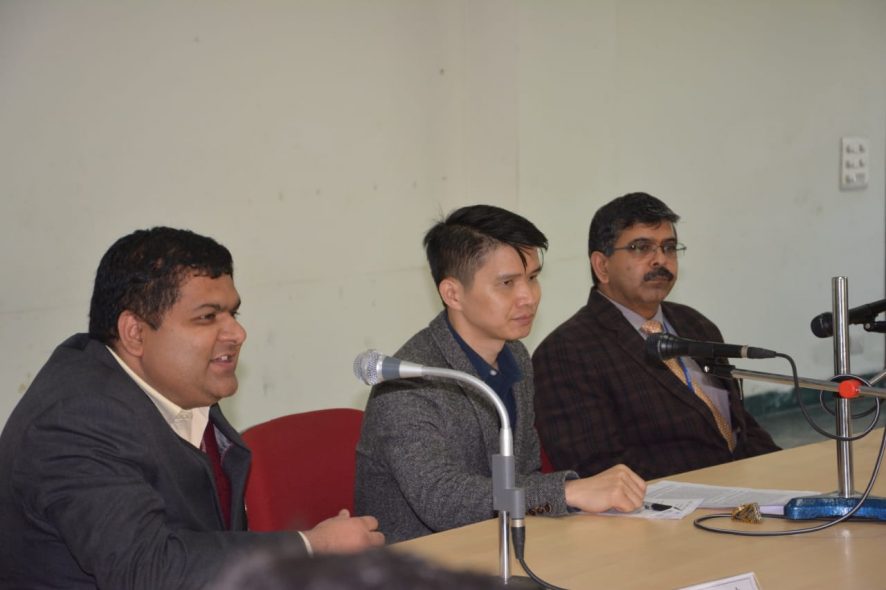Centre for Constitutional Law and Governance (CCLG), RGNUL organised a roundtable discussion on the topic, “India-China Rapprochement after the Doklam Standoff” on February 22, 2019. The guest speaker for the discussion was Dr Xie Chao, Assistant Research Fellow at the Institute for International and Area Studies, Tsinghua University, Beijing, China. The session was inaugurated by Prof (Dr) Naresh Kumar Vats, Registrar, RGNUL, followed by a detailed presentation by Dr Xie on India-China relations. Mr Saurav Sarmah, Assistant Professor of Political Science, RGNUL and Mr Siddhartha Fuller, Assistant Professor of Law, RGNUL responded to the points made by the Chinese scholar. The final part of the session was the question-answer round. RGNUL students actively participated in the discussion, which turned into a vigorous debate between Indian and Chinese perspectives.
Dr Xie described the US as the international hegemon that was losing its pre-eminent position to a rising China and so, it was pursuing an aggressive policy of containment to prevent China’s rise. The US President Donald Trump considers China as America’s main strategic rival and wants to use India, another rising power to counter China’s influence in Asia. Dr Xie warned that India should not be inimical towards China, as American support to India was inconsistent. For instance, during the Doklam crisis in 2017, US did not help India. Instead, China de-escalated, as it did not want a military conflict with India. The 2018 Wuhan Summit between President Xi Jinping and Prime Minister Narendra Modi has normalised the India-China relations. China welcomes India’s participation in multilateral organisations like SCO, BRICS, AIIB and BRI, but cannot be expected to make unilateral concessions to India, e.g. in NSG or on Pakistani terrorist organisations, detrimental to its own national interest. China does not want a violent conflict with the US and has adopted the strategy of social creativity to establish alternative norms and institutions, instead of challenging the US hegemony.
Mr. Sarmah challenged the notions that US was a declining power and China’s rise was sustainable in the long run. He emphasised that India wanted strategic partnership with both the US and China and would pursue a strategic policy based on its own national interest, whether it was within the sovereign territory of India in Arunachal Pradesh, the Indian Ocean Region, where China’s influence is growing or related to Bhutan’s territorial integrity in Doklam. India’s peaceful intentions have been established by Prime Minister Modi’s efforts to normalise India- China relations after Doklam. He assured Dr Xie that India’s relations with the US, Japan and other powers are not for containment of China, but for increasing India’s security, technological development and trade. India is prepared to co-operate with China on multilateral projects, including BRI, if there was clarity on China’s strategic objectives and mutual respect between the two rising powers. Mr Fuller argued that China often makes unreasonable claims as bargaining tactic, for instance, in Arunachal Pradesh and that following international norms, would increase the credibility of China. Dr Xie clarified that the American decline was not in absolute terms, but relative to a rising China and appreciated India’s pragmatic approach, while criticising the rhetorical media narrative. He insisted that international norms are shaped by perceptions and interpretations and dialogue and compromise are the only methods of maintaining good relations between India and China.
The discussion got even livelier with the participation of students in the question-answer round. Dr Xie responded to the questions quite graciously, emphasising the realist principles of foreign policy, instead of taking a historical, legal or moralistic approach. The session ended on time, but the debate continued beyond the roundtable, as the questions of students did not seem to cease.






